#popular opposition to dictatorship
Explore tagged Tumblr posts
Text
88 years ago today 4 fascist generals attempted a coup d'etat on the Second Spanish Republic. The right wing had lost the February elections to the United Front, made up of almost all of the left parties in the republic. This failed coup d'etat turned into the Spanish Civil War, during which the western democracies abandoned the republic in tacit approval of the reactionaries, and after which the 40 year long fascist dictatorship was protected by the US and NATO for the sake of anti-communist repression.
Fascists do not care about election results, bourgeois legality is only useful to them for as long as they can exploit it. Liberal democracies and popular fronts are not inherently anti-fascist either, they have consistently shown a preference for fascists and other reactionaries. The only viable opposition to fascism has always been the revolutionary organization of the proletariat with the communist party, advocating for anything less is naive at best and active collaborationism at worst.
913 notes
·
View notes
Note
What is syndicalism?
A syndicate is another term for a labor union. Syndicalism is a trend within socialism, most popular in Western countries in the early 20th century prior to the Russian Revolution, which holds that labor unions as opposed to political parties are the best catalyst for revolution, and that through the direct action of labor unions the capitalist class could be overthrown and replaced by a united working class.
The most well-known syndicalist organization is probably the Spanish anarcho-syndicalist CNT. While sometimes referred to as syndicalist, the IWW in the United States has always referred to itself as part of the industrial unionist movement and criticized the federalism of the syndicalists proper, preferring the "One Big Union" concept to a federation of smaller unions.
After the Russian Revolution, there was a massive shake-up in the syndicalist movement, with many former syndicalists choosing to adopt Bolshevism instead due to the sudden success of the Bolsheviks in Russia. This allowed the anarcho-syndicalists to gain greater prominence within the wider syndicalist movement, to the point where today you hardly see any non-anarchist syndicalists. After the end of World War II, as living standards in the capitalist West increased due to the consolidation of imperialism and the advent of neocolonialism, Western labor unions lost much of their radicalism and became largely subsumed into standard capitalist labor relations. While organizations such as the CNT and IWW still exist, they are shadows of their former selves.
Syndicalism post-1917 has defined itself mainly in opposition to Leninist concepts such as the dictatorship of the proletariat and central economic planning. Syndicalists believe that workplaces should be governed directly by their workers through their respective unions and that cooperation between unions should be mediated through mutual agreement rather than coordinated by a central authority.
In contrast, Marxist-Leninists, while in no way denying the benefits of labor unions which have always played a significant and positive role in socialist nations, believe that workplaces should ultimately be subordinate to the interests of the people as a whole and that the DotP has a responsibility to coordinate economic activity for the benefit of all of society. That is to say, if the actions of one workplace have a deleterious effect elsewhere, then those actions must be prevented even if they were agreed upon by the workers within that specific workplace.
216 notes
·
View notes
Photo

How Did Hitler Rise to Power?
The rise of Adolf Hitler (1889-1945), the Nazi dictator of Germany from 1933, was enabled by those already in power eager to take advantage of his popularity. Hitler promised to make Germany great again after the humiliation of WWI by restoring Germany's lost territories, returning to traditional German values, achieving full employment, and destroying 'enemies' like Communists and Jewish people.
Hitler's rise to power was a surprisingly long process, involving many steps and several significant setbacks such as his imprisonment following the failed coup known as the Beer Hall Putsch in November 1923. Hitler's rise to power effectively took a decade, with the Nazi Party gaining just 12 seats in elections for the German Reichstag (Parliament) in 1928 (from a total of 491 in that election), 107 in 1930, 230 in July 1932, 196 in November 1932, and 288 seats in 1933. Once securely in power as chancellor, in 1933, Hitler quickly eliminated all opposition and established a totalitarian regime with himself as undisputed dictator, Germany's Führer.
Adolf Hitler in SA Uniform
Imperial War Museums (CC BY-NC-SA)
Adolf Hitler and the Nazi Party rose to power for the following reasons:
The harsh terms of the Treaty of Versailles riled many Germans, especially the guilt clause for starting WWI, and traditional political parties were tarnished by association with the signing of the treaty. Hitler promised to overturn the treaty and restore German pride.
The fallout of the Great Depression led to mass unemployment and hyperinflation leading voters to turn to more extreme political parties.
The weakness and ineptitude of successive Weimar Republic coalition governments.
Hitler promised full employment through such programmes as road building and rearmament.
In return for their support, Hitler promised business leaders lucrative state contracts such as arms manufacturing. This idea was also popular with the German Army.
Hitler appealed to traditional German beliefs like the greatness of the nation, strong family values, and a classless society.
Hitler promised an expansion of Germany to find new lands and Lebensraum ('living space') where the German people could prosper.
Hitler used propaganda to identify what the Nazis described as common enemies of the state, such as outsiders and Jewish people who, he claimed, were holding Germany back.
A cult of Hitler was created, which promoted the idea that he was the saviour of Germany.
The establishment thought that by inviting Hitler to power, they could better control the Nazi phenomenon and benefit from its popularity themselves.
Once made chancellor, Hitler used his power to eliminate rivals. He ensured the German parliament had little power and began to establish a dictatorship with himself as the undisputed head of a one-party police state.
Historians continue to debate the weight of each of the above points in accounting for Hitler's rise to power.
The Treaty of Versailles
The First World War (1914-18) was formally terminated by the Treaty of Versailles, which dictated the terms of the German surrender. Germany lost a significant part of its territory, was obliged to pay reparations, and had to accept full responsibility for starting the conflict. The German people protested at these terms in 1919, and those German politicians who had agreed to it were widely referred to as 'the criminals of 1919'. This resentment was fuelled by the myth that the German people had been let down in WWI by the high command of their army, which had 'stabbed them in the back', otherwise, they might have won the war, many thought. Consequently, there was a feeling that the political and military establishment of the new Germany, the Weimar Republic (1918-33), could not be fully trusted.
Europe after The Treaty of Versailles
Simeon Netchev (CC BY-NC-ND)
The fascist National Socialist German Workers' Party (NSDAP or Nazi Party for short) was founded in 1920. The party was neither socialist nor at all interested in workers, but Adolf Hitler had chosen the name to give his ultra-nationalist party as wide an appeal as possible. Hitler was able to exploit the anti-establishment feeling as the Nazis were complete outsiders. As early as 1925, in his book Mein Kampf, Hitler promised to abolish the terms of Versailles and create a new 'Greater Germany'.
Continue reading...
76 notes
·
View notes
Text
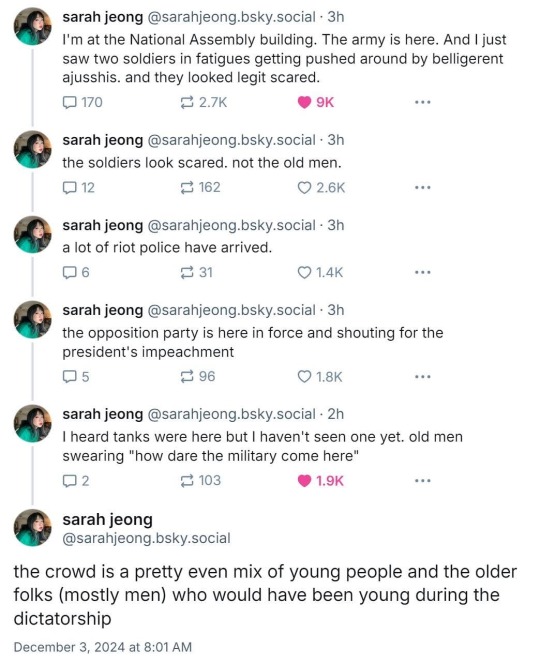
LETTERS FROM AN AMERICAN
December 3, 2024
Heather Cox Richardson
Dec 04, 2024
For an astonishing six hours today, South Korea underwent an attempted self-coup by its unpopular president, Yoon Suk Yeol, only to see the South Korean people force him to back down as they reasserted the strength of their democracy.
In an emergency address at nearly 11:00 last night local time, Yoon announced that he was declaring martial law in South Korea for the first time since 1980, when special forces under a military dictatorship attacked pro-democracy activists in the city of Gwangju, leaving about 200 people dead or missing. South Koreans ended military rule in their country in 1987, writing a new constitution that made South Korea a republic.
Yoon claimed he had to declare martial law because his political opponents were sympathizing with communist North Korea. It was a thin pretext.
A member of the conservative People’s Party, Yoon was elected to a five-year presidential term in 2022 after a misogynistic campaign fueled by young men who saw equal rights for women— whose average monthly wage is 67.7% of that a man, according to the BBC’s Laura Bicker—as reverse discrimination that is taking away their own rights and opportunities.
Before his election, Yoon had no experience in the National Assembly, and once he was in office, his popularity slid to record lows. In legislative elections held last April, voters crushed Yoon’s party, giving opposition parties 192 of 300 seats in the National Assembly. The legislature fought with Yoon over his budget and launched a number of corruption investigations into Yoon’s allies as well as his wife.
And so, Yoon declared martial law, bringing the media under his control and banning political activities, “false propaganda,” “gatherings that incite social unrest,” and strikes. Police officers formed a blockade around the National Assembly, and helicopters landed on the roof to prevent lawmakers from getting inside to overturn Yoon’s declaration.
The South Korean people reacted immediately. Reporting from Seoul, John Yoon of the New York Times recounted the story of a real estate agent who watched President Yoon’s speech, got in his car, and drove for an hour to get to the National Assembly. The man told journalist Yoon, “I thought, ‘The end has come,’ so I came out. The president of a country has exerted his power by force, and its people have come out to protest that. We have to remove him from power from this point on. He’s in a position where he has to come down.”
Editor of The Verge Sarah Jeong, who works out of the U.S. and does not cover South Korean politics, happened to be working in Seoul this week and was on site after a night of drinking, giving an informed and honest account of what she was seeing. “[T]he crowd is a pretty even mix of young people and the older folks (mostly men) who would have been young during the dictatorship…. I heard tanks were here but I haven't seen one yet. [O]ld men swearing "how dare the military come here.”
Michelle Ye Hee Lee, Washington Post Tokyo/Seoul bureau chief, reported that the National Assembly managed to pull together a majority of its members—190 of 300—in about two and a half hours to participate in a unanimous vote to overturn Yoon’s emergency declaration of martial law. That vote included members of his own party.
Political commentator Adam Schwartz shared a video taken by the leader of South Korea's Democratic Party, Lee Jae-myung, as he climbed over the wall of the National Assembly to vote against Yoon’s martial law declaration. Other videos showed people in the streets boosting legislators over the walls for the vote.
Yet another video showed South Korean soldiers trying to get into the National Assembly during the voting thwarted by people wielding a fire extinguisher and flashes from cameras.
While the law said Yoon had to abide by the legislators’ vote, it was not clear whether Yoon would do as the law required. About six hours after he had declared martial law, Yoon bowed to the National Assembly and the popular will and lifted his declaration.
Yoon has been widely condemned, and South Koreans from all parties, including his own, are calling for his resignation or impeachment. Raphael Rashid of The Guardian reported today that on the morning after the attempted coup, South Koreans are bewildered and sad. “For the older generation who fought on the streets against military dictatorships, martial law equals dictatorship, not 21st century Korea. The younger generation is embarrassed that he has ruined their country’s reputation. People are baffled.”
For the rest of the world, though, South Koreans’ immediate and aggressive response to a man trying to take away their democratic rights is an inspiration. Among other things, it illustrates that for all the claims that autocracy can react to events more quickly than democracy can, in fact autocrats are brittle. It is democracy that is determined and resilient.
The events in Seoul also cemented the shift in social media from X to Bluesky, where news was breaking faster than anywhere else, in a way that echoed what Twitter used to be. Since Twitter was a key site of democratic organizing until Elon Musk bought it and renamed it X, that shift is significant.
And finally, the events in South Korea emphasize that for all people often look to larger-than-life figures to define our nations, our history is in fact made up of regular people doing the best they can. Journalist Sarah Jeong found herself entirely unexpectedly in the middle of a coup and, recognizing that she was in a historic moment, snapped to work to do all she could to keep the rest of us informed. “I’m f*cking blasted and hanging out in the weirdest scene because history happened at a deeply inconvenient hour,” she wrote on Bluesky. “[S]o it goes.”
When she finally went home, Jeong wrote: “I expensed my cab ride home. I’m tired so I put ‘korea coup’ down in the expense code field.”
LETTERS FROM AN AMERICAN
HEATHER COX RICHARDSON
#Letters From An American#Sarah Jeong#South Korea#political#history#Bluesky#musk#social media#autocracy#autocrats#democracy#The Verge#Yoon Suk Yeo
40 notes
·
View notes
Text
Some people are now shocked that someone like Călin Georgescu managed to secure first place in the initial round of the presidential elections. I’m not entirely surprised, though. We live in a country where, on YouTube’s Romania Top 100 songs, 99% are manele—songs that mostly glorify money—sung by men who look worse than gorillas. And most of these songs are local, not foreign. This tells me that anti-globalism already has deep roots here. Why bother learning English or any other language? Why bother learning about other cultures? Why bother doing any of this when "Made in Romania" is seen as the best? But is it, though?
A few years ago, I finally heard a BTS song on the radio. For Romanian ARMYs, you know how rare this is—back then, even rarer. I was thrilled—until the radio host started talking trash about them. They were “too perfect,” their skin was “too flawless,” they “looked like girls.”
We live in a country where if a man showers more than two or three times a week, uses skincare, or simply cares about his appearance, he’s ridiculed as being “girly” or even called “gay”—which, by the way, is still used as an insult here, or at least it was when I was in school. BTS is dismissed as being “too girly” by Romanian standards, but the same men who “sing” about having multiple women and flaunt oversized bellies spilling out of their clothes are somehow role models?
Why, then, is it surprising that someone like Călin Georgescu has become so popular that he stands a real chance of becoming president? How did we get here? What happened? I used to think there was no one worse than Trump, but I was so, so wrong.
Călin Georgescu literally claimed—out loud—that he is not only skeptical but certain that humanity never landed on the moon, that H2O is not actually H2O, and that water in its “natural, pure” form contains information. He supports both General Antonescu and Putin—two figures who are ideological opposites. He champions both the Orthodox Church and mysticism—again, two completely contradictory things. And then there’s his belief that giving birth via cesarean is harmful to women.
How did we get here? I’m angry, sad, disappointed, and worried. Where are we headed?
P.S. As soon as I woke up this morning, my mom told me that from now on, I need to learn to keep my mouth shut and not talk about politics to almost anyone. Are we going back to a dictatorship? It feels like I woke up in a parallel world. Still, while I still can, I won’t be silent.
#romania#romanian politics#calin georgescu#georgescu#romania presidential elections#2024 presidential election#ro-army#bts army#army#romanian army#don't look up#kate dibiasky#“not on a diet but I cry five times a day”#vote for lasconi#elena lasconi#lasconi
30 notes
·
View notes
Text
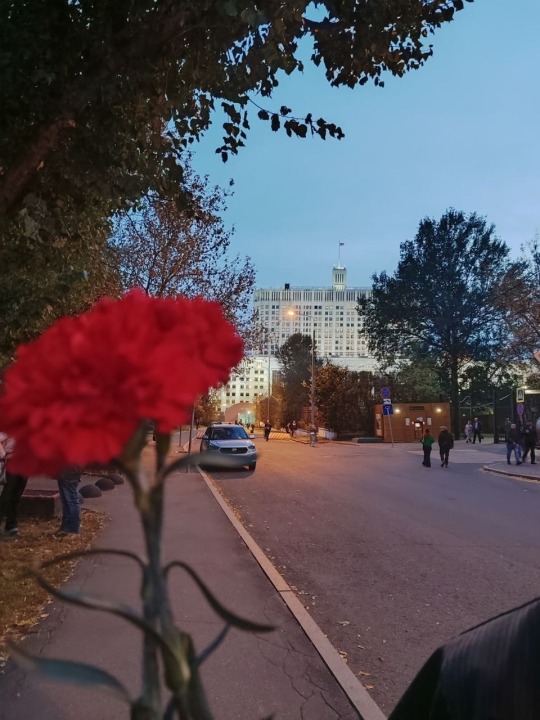
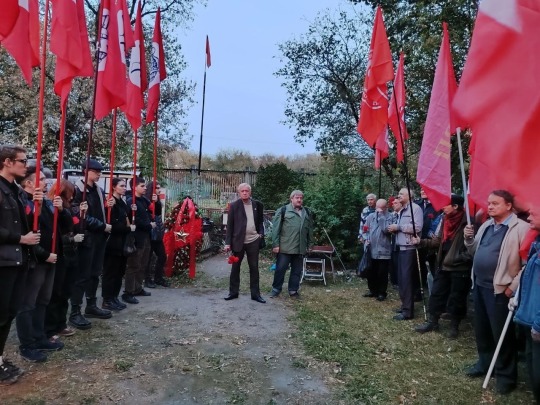
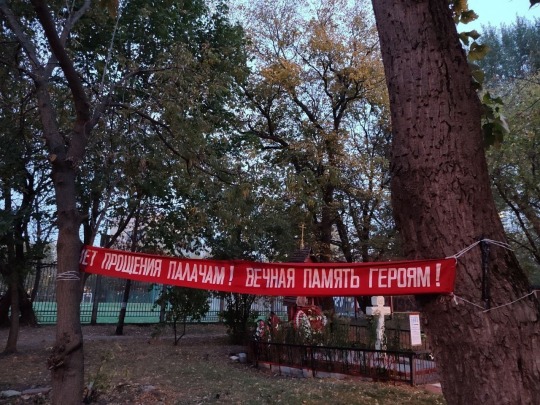
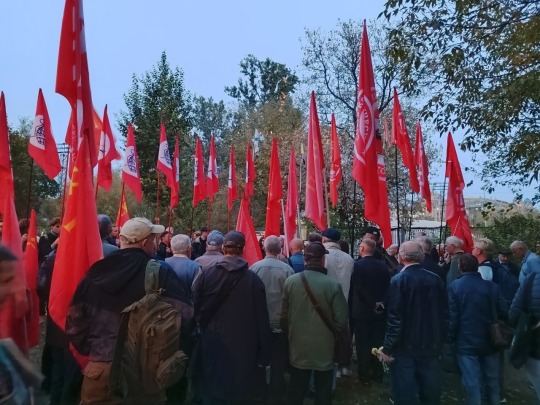
Moscow: Memorial for those who fell in the October 1993 popular uprising, Oct. 3, 2024.
MOSCOW: Today, October 3, 2024, members of the United Communist Party, the Russian Communist Workers' Party, the Union of Communist Youth, representatives of the "Independent Trade Union New Labor" and others took part in a memorial event dedicated to the popular uprising of October 3-4, 1993.
The events that took place during these days became a turning point in the establishment of an open bourgeois dictatorship in the Russian Federation. The degenerated part of the top of the CPSU, which treacherously put an end to the USSR and socialism in 1991, took a course on bringing the political and administrative structure in line with the needs of the development of the new bourgeois state, which arose on the basis of a raider seizure of public socialist property by a small group of people.
In these conditions, the Supreme Council and the Constitution, rooted in the Soviet era, despite the socialist content formally eliminated after 1991, were an obstacle for the new masters of the country in further strengthening their power and the complete appropriation of all property created by the people. This is precisely why President Boris Yeltsin carried out a coup d'etat, the purpose of which was to liquidate the last, in essence, remnants of Soviet power, real parliamentarism and popular representation.
For going beyond the constitutional field, Yeltsin was removed from office by the decision of the Supreme Council, but thanks to the leadership of the security forces that betrayed the Constitution and the Motherland, he managed to stay in power and successfully complete the coup. During this process, the uprising of the people who came out in Moscow in support of the legitimate government was brutally suppressed and drowned in blood -- thousands of people died.
Even after more than thirty years, the opposition forces do not forget what happened in those tragic days. Representatives of a number of political, trade union and public organizations met in the capital to honor the memory of those who died for Soviet power and to brand with shame the executioners who carried out a bloody forceful cover-up of the process of establishing the dictatorship of bourgeois raiders in our country.
The event was led by the Secretary of the United Communist Party (OKP) Central Committee Denis Sommer. The acting first secretary of the OKP Central Committee Vladimir Lakeev, members of the Russian Communist Workers' Party (RKRP) Artem Buslaev and Vera Basistova spoke.
The participants, as in all previous years, expressed their firm determination to fight to ensure that all those involved in the suppression of the popular uprising, no matter how many decades have passed since the tragic year of 1993, bear severe responsibility for their criminal acts, which have no statute of limitations.
Via United Communist Party
#Black October#Moscow#Russia#counterrevolution#memorial#protest#OKP#RKRP#communist#socialism#USSR#Supreme Soviet#Boris Yeltsin
34 notes
·
View notes
Note
fuck it. I'm saying this for the sake of our system and the others here, this might get unhinged asf.
Endos stalking this blog;
Our vents are NOT your propaganda. This is not your brainwashing fuel. Quit using a false sense of justice to bully mentally ill people on the internet. Call me whatever the fuck you want, sysmed, anti, traumascum, evil prosecutor, it has no effect on me. I REFUSE to let MY HOST or ANY OTHER SYSTEM have to deal with bullshit. How about, for every derogatory word you give us, we simply ignore it and make one for you? Will you accept that as a fair punishment? Or will you get butthurt all over again and complain about us being 'evil' and 'harassing you' when we would simply be returning your treatment of us. How about we treat YOU like the scum of the earth rather than uneducated people, how about we make fake resources ourselves, how about we do everything you do and say its all for the sake of equality and destigmatization whilst doing the opposite just like you? Is it suddenly bad to you? Will you fall victim to your own hypocrisy? Of course, we would never do that, not on this blog. But you'll ignore that and only point at the 2 hecklers in the audience of thousands, claiming that represents all of us. You hit us first, invading our spaces, twisting our words and logic into lies for your own gain just like a dictatorship. But just like history, you will fall. And we will live on through it, standing tall, standing together, standing not proud of having a debilitating mental disorder, but proud of knowing we triumph still. I propose we as askers on this blog and all anti endo blogs call ourselves something uniting, something with less room for dehumanization. We as a group are striving for a shared goal together, and we don't all need to have this same intense drive to fight for our dignity just to be included in the group name of something good. All I'm saying is regardless of how openly you fight against misinformation, or how vigorously, or even how little, your still fighting, one way or another. Why fight alone? We're already united under this blog so why not make a title for ourselves to unite us more, regardless of if we are actively fighting or not?
-Mocha of the Jester system
Ps: Host is going to be so ticked about this rant LMAO he HATES when we get into drama shit
^^^ if y'all want a title for yourselves as askers that would be amazing we're unsure how to set this up though,, perhaps make suggestions for what you might want if you want any and we'll make a poll on it to see whats the most popular choice?
And yeah, we agree with this whole rant
Edit : plain text below
pt : fuck it. I'm saying this for the sake of our system and the others here, this might get unhinged asf.
Endos stalking this blog;
Our vents are NOT your propaganda. This is not your brainwashing fuel. Quit using a false sense of justice to bully mentally ill people on the internet. Call me whatever the fuck you want, sysmed, anti, traumascum, evil prosecutor, it has no effect on me. I REFUSE to let MY HOST or ANY OTHER SYSTEM have to deal with bullshit. How about, for every derogatory word you give us, we simply ignore it and make one for you? Will you accept that as a fair punishment? Or will you get butthurt all over again and complain about us being 'evil' and 'harassing you' when we would simply be returning your treatment of us. How about we treat YOU like the scum of the earth rather than uneducated people, how about we make fake resources ourselves, how about we do everything you do and say its all for the sake of equality and destigmatization whilst doing the opposite just like you? Is it suddenly bad to you? Will you fall victim to your own hypocrisy? Of course, we would never do that, not on this blog. But you'll ignore that and only point at the 2 hecklers in the audience of thousands, claiming that represents all of us. You hit us first, invading our spaces, twisting our words and logic into lies for your own gain just like a dictatorship. But just like history, you will fall. And we will live on through it, standing tall, standing together, standing not proud of having a debilitating mental disorder, but proud of knowing we triumph still. I propose we as askers on this blog and all anti endo blogs call ourselves something uniting, something with less room for dehumanization. We as a group are striving for a shared goal together, and we don't all need to have this same intense drive to fight for our dignity just to be included in the group name of something good. All I'm saying is regardless of how openly you fight against misinformation, or how vigorously, or even how little, your still fighting, one way or another. Why fight alone? We're already united under this blog so why not make a title for ourselves to unite us more, regardless of if we are actively fighting or not?
-Mocha of the Jester system
Ps: Host is going to be so ticked about this rant LMAO he HATES when we get into drama shit
64 notes
·
View notes
Note
I care. Come rant to me about your worldbuilding, amigo.
HHHHAHAHGA OKAY. THANK YOU…. I will use this as an excuse to yap for thirty million years.
I will talk about plot things first, or world building.
Pierre is the sheriff of Fruit of Javelina. He has two right hand men, Andrew and Daniel, and a wife, Christine. The couple came from France and travelled to America during the end of the westward expansion to cash in on it and the people who never managed to settle in. Pierre chose Javelina because he thought it would be easy to control, seeing as it was an extremely small town with minority groups as the main population. And for a while, that was true. Pierre set as many laws as he wanted about anything he wanted, and sent whoever he wanted to jail under his so called law. He didn’t “hate” the colored residents, he just exploited them because it was easy and considered normal to do. And above all it made him money. What he did hate, though, was queer people. And he had unknowingly chose a town full of them. Over time his rules and sense of justice became crueler and more of a dictatorship. He absolutely hated the queer residents of “his” town and abused them frequently, but he was also keenly aware of the money they made. Adrien, Lionel, Mandy, Ramsie, Annabelle… they were all successful. Adrien was a famous rodeo cowboy that stopped by Javelina frequently to catch a break from the busier towns. Mandy And Ramsie owned a ranch and farm that exported their crops. Lionel owned and ran his own saloon, and Annabelle owned and ran her own brothel, both of which frequently brought in customers from outside towns. A sense of unrest and frustration filled Javelina, as though they very well knew they were being exploited, they couldn’t realistically do anything about it. They’d be jailed or killed.
And Christine, indoctrinated by her husband’s misogynistic and homophobic views, treated the women of Javelina just as poorly. Many came to her with complaints about her husband, hoping that because she too was a woman, that she would understand. But it was the opposite. For a time Annabelle was forced to shut down her brothel and return the building to its former function as a hotel, although of course she continued her business in secret.
That is, of course, until Sheep shot and killed him during an altercation. Annabelle took Christine in and rehabilitated her, and Sheep marked that day as the last time they’d ever draw their gun.
MISC INFO:
It’s rumored that Pierre and Christine were in a lavender marriage because of how much they hated each other, and never once touched in public. After Pierre was killed, Christine discovered and explored her bi curiosity, and Daniel confided that he and Pierre had been “very close friends”. If so, Pierre never got to explore his sexuality before his death.
Adriens rodeo outfit was originally red without any theming to it. Years of working in the sun faded it to a pink, and he decided to run with it and add heart embellishments to it. It became more popular with fans that way as well. (It’s also why his regular wardrobe isn’t particularly pink.)
Adrien and Lionel sometimes do pinup photos for Annabelle’s brothel.
Pumpkin Sheep is TwoSpirit.
Sheep is also good with children, and acts as the official, unofficial babysitter for the parents in town when they’re needed. Acts as a father and mother figure for Ramsie as well.
Adrien is a chronic gambler and is extremely good at it. Frequently drains the wallets of anyone he plays with, but he always returns the money after the game. It’s only the thrill he’s looking for. If he loses, he’ll let his opponent keep what they earned off him.
Lionel brews and distills his own alcohol, and is renowned for the incredible quality at such a low price even outside of Javelina.
#ask#crumb friend#oc#original character#original story#cowboy oc#cowboy#cowboys#queerfolk#there is. So much more I want to talk about but. Grins.
29 notes
·
View notes
Text
Thom Hartmann at The Hartmann Report:
Former Republican Congressman Adam Kinzinger is wondering out loud if “President Musk” will force “Vice President Trump” and Speaker Mike Johnson to shut down our government as Musk tweets his orders to the GOP. It’s all about raising the debt ceiling, Trump says, so they can roll out the next round of tax cuts for billionaires, paid for by average working people. It seems like a bizarre power play: The actual story is much more sinister. As Trump is in the process of teaching America, it’s impossible to disentangle democracy-ending authoritarianism from billionaire corruption of government. They require each other. And the way this will play out won’t need a crystal ball to see: Trump has already begun traveling a well-trod path that leads to the destruction of our form of government. While all authoritarians who take over democracies initially come to power on a wave of popular sentiment, presenting themselves as normal politicians bent on “shaking up the system,” once they begin their crackdowns against political opposition their popularity typically collapses. At that point, they need three things: — A compliant, financially, and politically dependent media; — subservient, terrified, or complicit politicians; — and a captured, corrupt judiciary loyal to the idea of oligarchy and beholden to wealthy sponsors (think Clarence Thomas and Sam Alito). With these three elements of democratic capture they can gaslight the public, shovel money to their oligarch buddies, and expand their own power in defiance of increasingly feeble popular, political, and legal challenges. This is nothing new; it’s a formula as old as republican forms of government. It’s how the Greek democracy ended, how Rome was brought down, and how every autocratic government on Earth that started out as a democracy got to where they are today. Russia, Hungary, Egypt, the Philippines, Malaysia, Singapore, Venezuela, Turkey, etc., etc.
Most recently, President Yoon tried it in South Korea, but he’d failed to consolidate his control over those three systems that can defend or corrupt democracy, so he failed. Trump and the oligarchs who brought him to power, both in Russia and the US, don’t intend to make the same mistake in 2025. — The first major roadblock to authoritarian capture is the press. As long as the public is well-informed about a wannabee autocrat’s antidemocratic efforts to dismantle government, he’ll encounter significant popular opposition. With a compliant, fawning, or terrified press, however, history shows it’s not that difficult. — The second biggest obstacle to authoritarian (or “fascist”) takeover of government is typically found within the institutions of that government itself. Bureaucrats and agencies protective of their own fiefdoms that have historically defended various aspects of the nation and its democratic government tangle up efforts at regulatory capture, and the senior management of these agencies refuse to go along with the new strongman, as Trump learned in his last term. To destroy a democracy, a strongman must neuter these people and seize control of their agencies.
— Finally, would-be fascist leaders must hobble the judiciary and dominate the police and legal systems of their nation prior to their final takedown of that country’s democracy. Trump learned these lessons in his first term, just as did both Vladimir Putin and Viktor Orbán in their first terms when Russia and Hungary were both still operating as democracies. Which is why it was only in their second terms that both Putin and Orbán changed their nation’s libel laws so they could use lawfare to cripple the Russian and Hungarian independent press. Reporters, commentators, and news agencies were sued into bankruptcy if they didn’t immediately bow to the Putin’s and Orbán’s demands for positive coverage, and those news agencies surviving were then acquired — as Musk did with Twitter — by friendly oligarchs. Then those two went after the agencies of government itself. During Putin’s second term as Russian president he abolished the direct election of governors, replacing it with a system where Putin loyalists were appointed by the Kremlin, effectively ending regional political autonomy and the ability of local politicians to stand up to him. Similarly, after securing a supermajority in 2010, Orbán's government passed a new constitution that centralized power, curtailed judicial independence, and reduced checks on executive authority. He also instituted term limits on judges so within a few years he was able to remake the Hungarian judiciary in his own image. Over the past 8 years, Trump has done much the same thing through the electoral primary process, purging the GOP of “RINOS” and endorsing MAGA loyalists at both the local, state, and federal levels, as well as in elected state judiciaries. He’s now solidifying that power and cowing any remaining opposition with his threats to persecute, prosecute, impoverish, and imprison Republicans like Liz Cheney, Adam Kinzinger, and Alexander Vindman who dared stand up to him. Although it’s rarely mentioned in the media, terror is today spreading across what’s left of the non-MAGA GOP at all levels.
Like Orbán and Putin in the early months of their second terms, Trump is also threatening prosecutors and judges, while his captive senators prepare to push through Trump-loyal judges. Just this week, Trump demanded that Republican senators do whatever is necessary to block any more of President Biden’s judicial nominees from ending up on the federal bench. And, like both Putin and Orbán, The New York Times reports that Republicans beholden to Trump are now openly discussing rewriting the US Constitution. Putin then purged Russian federal agencies of anybody showing any signs of independence, replacing senior management of all agencies with his own mostly incompetent and inexperienced toadies or employees of friendly oligarchs. They leaned heavily on Putin precisely because of their own lack of experience and expertise. His purge was particularly radical in Russia’s equivalents of the FBI and CIA, the keys to his seizing total control of the police and intelligence agencies that could be wielded as weapons against his opponents. Deeply corrupt loyalists in these positions were essential to his seizing total power. Trump is similarly appointing profoundly unqualified and incompetent nominees to federal agencies, including numerous Republicans who’ve lost elections and thus are doubly dependent on his good graces for both their political and personal economic futures.
[...] Once he’s crushed dissent and seized total control of state and federal governments, Trump will turn their agencies and powers to enriching himself and his oligarch buddies (including Republican governors), just as Putin and Orbán (and every other autocrat in history) have done. We saw the first indicator of this strategy when he told a group of fossil fuel executives that if they gave him a billion dollars he’d strip out federal environmental regulations that reduce their profits. The Senate Budget Committee, under the stewardship of Democratic Senator Sheldon Whitehouse, is currently investigating this naked solicitation of a bribe, but when that committee is taken over by Republican Chuck Grassley in early January that probe will end. That singular moment will signal the beginning of the end — at least for the next two years — of any meaningful congressional resistance to America’s morbidly rich oligarchs and their industries corrupting government to their own advantage while Trump pursues his fantasies of revenge.
Thom Hartmann wrote a solid report on America cannot afford to ignore the dangers of the descent into dictatorship under Trump.
#Donald Trump#Authoritarianism#Trump Regime#Trump Administration II#Elon Musk#Mike Johnson#Vivek Ramaswamy#Vladimir Putin#Viktor Orbán#Liz Cheney#Adam Kinzinger#Alexander Vindman
13 notes
·
View notes
Text
Amidst mounting popular opposition to the Trump administration, the Democrats are responding by seeking to prevent any opposition to the corporate-financial oligarchy and its war on the working class. Just over 100 days into the Trump administration, there is mounting anger over the government’s assault on immigrants, its sweeping attacks on workers and social programs and its efforts to establish a right-wing dictatorship in the United States. Trump’s poll numbers are falling sharply, and recent weeks have seen demonstrations involving millions of people in cities throughout the United States. The response of the Democratic Party is to smother this opposition and prevent it from challenging the domination of the corporate-financial oligarchy and the two-party system, through which the ruling class carries out its policies of imperialist war and social reaction. This perspective was clearly articulated by the New York Times, speaking for the Democrats, in its lead editorial published on May 1, under the headline, “Fight Like Our Democracy Depends on It.” While purporting to lay out a strategy for opposing Trump, the editorial is primarily concerned with the dangers posed by a mass anti-Trump movement. It is necessary, the Times writes, to develop a “patriotic response” to the Trump administration. This opposition must be developed “soberly and strategically, not reflexively or performatively.” The editorial cautions against “maximalist” opposition, which might “prioritize emotion over effectiveness.” By a “patriotic” and non-“maximalist” opposition to Trump, the Times means an opposition that is based on support for American imperialism and the profit interests of the gigantic corporations. And behind the concern over “emotion” lies a deep and abiding fear of explosive social opposition, above all, from the working class. Thus the Times calls for a
continue reading
6 notes
·
View notes
Text
The Soviet Revolution of October 1934
The Second Spanish Republic is a figure in history which tends to be overly glorified by the contemporary Spanish left, including some excessively folklorist communists, as a desire to look through history for any instance when opposition to the monarchy and reactionaries was the hegemonic position. After 40 years of a fascist dictatorship, and 46 years of a liberal democracy that has exposed social-democracy's bankruptcy, the Second Republic is a time when the PCE (Communist Party of Spain) was a force to be reckoned with, at least compared to today, with a few hundred thousands along its lines. Despite the Second Republic lasting from 1931 to 1936, the aspects that tend to be glorified are the times of the Popular Front, the electoral alliance from the PSOE to the PCE that won the February 1936 elections, and ruled until the coup d'etat of July 1936. Perhaps unconsciously, perhaps consciously, the years of 1932-1935 tend to be not forgotten, but minimized.
This is because the Second Republic was not a "popular" state, it wasn't even nominally progressive for half its history. And again, in an exercise of willful ignorance, when its repressive episodes are discussed, most tend to focus on the Black Biennium, as historiography knows it, the two years (1933-1935) when the right governed under the CEDA coalition, which included falangists, monarchists, even Carlists. But the history of repression in the Second Republic begins not even a month after its constitution was ratified. The Castiblanco incidents of December 1931 saw a few day workers killed by the police during a peaceful demonstration asking for work, afterwards it turned violent and 4 policemen were lynched by the workers. That same week, in the Arnedo incidents, the 5th of January 1932, the police shot into a crowd of striking workers in the town's square, renamed recently to Republic Square. 11 people were killed, two of them a mother and his 4 year old son, another a 70 year old woman. 5 others were permanently left unable to work. Just a year later, in January of 1933, 19 men, 2 women and a child were massacred in the Casas Viejas Incident, after an attempted uprising and occupation of the police quarters.
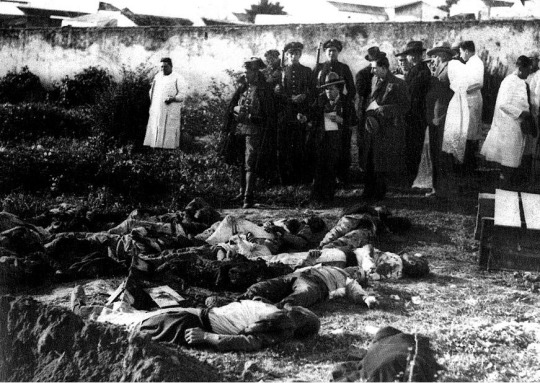
The Second Republic was always an anti-worker state, from its very beginnings. Regardless of what its constitution said, the social advances of the republic were lubricated with worker's blood.
Let's set some context for the subject of this post: The PCE, section of the Third International, found itself at risk of dissappearence at the end of the 1923-1930 dictatorship. It only really began to recover after José Diaz was elected General Secretary in 1932, it had about 1.000 members at this time, and by 1934 it had risen to 15.000 members, without counting the members of its youth wing. Internationally, the meteoric rise of fascism was unignorable. Nazi-fascism and fascism had seized power in Germany and Italy, and similar tendencies in Portugal and Austria were also in power, in the form of Salazar's Estado Novo in the former and Dollfuß' austrofascism in the latter, himself killed by outright nazi-fascists. Spain had its supposedly progressive Republic, of course, but it did not prevent the JONS to be founded in 1931 and the Falange in 1932, which during the civil war would merge into the infamous FE de las JONS, the Spanish Falange of the National-Syndicalist Offensive Juntas (The Falange is still a legal party now!). The leader of the CEDA, which would later govern during that Black Biennium I mentioned earlier, attended the Nürnberg Congess of 1932, where the pictures of those massive nazi-fascist rallies come from.
The 4th of October, 1934, 3 CEDA ministers had been chosen to enter the government, and in response, a strike, called the Revolutionary General Strike, was called for the following day, the 5th of October, 90 years ago today. The organization of this strike was done between the PCE, CNT (national confederation of workers, an anarcho-syndicalist union) and PSOE. The will to call the strike was not equal, however. The meeting minutes of the evening and night of the 4th show that the CNT was not very convinced of the strike and flip-flopped a lot, while the PSOE only decided to support the strike once it became impossible for them not to. The PCE, on the other hand, had already spent a few months warning of this, and preparing.
Barely a month before October, the police found a shipment of weapons going from the port of Gijón to Mieres, the future epicenter of the revolution. There were three armed shipments, and while the other two reached their destination, the third one being found almost lead to Indalecio Prieto, of the PSOE, being arrested. As a result, the weapon stashes in various places in Madrid (Casa del Pueblo, Ciudad Universitaria, Cuatro Caminos). These weapon stashes were supposed to supply the revolutionary strike in Madrid, and since they were found, the nascent revolutionary center was stillborn, since it was unable to arm itself. These same weapon stashes would later be replenished and used by the first militias of Madrid in the July 1936 coup d'etat
Nevertheless, the call for a strike was distributed at 6:00 of the 5th, but it was only heeded in Asturias, Madrid, Vizcaya, Cataluña, plus a few weak points (Cantabria, Aragón, Alicante, León, Palencia, Málaga). The reason the call was not heeded in broader parts of the country was because the agricultural day workers, predominant throughout the central meseta and south had already carried out their own strike that same year. They were recovering, they feared the repression that was still fresh in their minds, and it did not help that the predominant political organization among them, the CNT, took too long to support the strike, they simply were not prepared. It is impossible to understate how crucial this point is. The greatest worker strata in Spain were unable to be reached by the call to a revolutionary strike, for reasons related to the situation, but because of the inability of the PCE of this time to truly penetrate the social majority.
At any rate, the Revolutionary General Strike was not ignored everywhere, from these days comes this picture of Madrid's very center devoid of people, withholding their work, but impotent to do anything more:
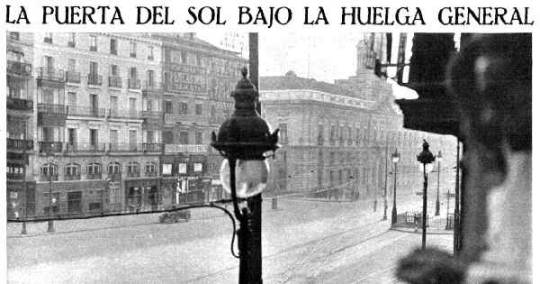
The Second Republic did not hesitate to stifle this strike, using planes and naval and land artillery. Once again, Spanish capital required trails of this country's reddest blood to line the streets, not shying away from employing the help of fascists such as the up-and-coming General Franco, sent to repress the workers of Asturias, where the strike was incandescent with revolutionary impetus. Before talking about Asturias, I won't ignore the other places where the strike was also popular. In Guipúzcoa and Vizcaya, The Basque Country, repression was just as bloody, executed by the Guardias de Asalto (Assault Guards), killing 40 workers in Vizcaya. There, the "Revolutionary Committee of Vizcaya", led by the UGT, was quickly dissolved. In Cataluña, a Catalan state was quickly declared, lead by the bourgeois Esquerra Republicana de Catalunya (Catalonian Republican Left), but was just as quickly put down with another 40 dead.
Asturias is another story, one that lasted for two weeks. It isn't much, but in those two weeks, the Spanish proletariat came the closest to holding political power, closer than any other time in its history. There, the strike did have a pre-existing entity capable of organizing the strike: the Worker and Peasant Alliance formed the 1st of April of that year, an armed force influenced by UGT, CNT (only present in the Asturias alliance), the Asturian Socialist Federation, and the PCE, whose militants often represented the most advanced elements of these alliances, but simultaneously relatively few. These alliances were heavily inspired by the Soviets, and often talked about the Sovietization of industry and of opposing colonialism. While this is evidence that it really was an attempted revolution, and that they were inspired by the Bolshevik revolution, their attempt to imitate the USSR's Soviets instead of learning from them was one of the many factors that provoked its defeat. Despite the name, the Worker and Peasant alliances were never as strong among peasants, not a lot of effort was put into it.
Another organization that was relevant during the October Revolutionary Strike were the Workers and Peasant's Antifascist Militias (MAOC in Spanish), a paramilitary militia, founded by Antonio Modesto, a member of the PCE educated in the USSR, he'd later become famous within the republican side of the Civil war. These militias were few but competent, they counted 150 members in Madrid and Asturias each, and while the Asturias militias participated in the revolution, the ones in Madrid sabotaged the roads and railways leading north, to avoid reinforcements getting to Asturias. These militias would later be the base from which the Fifth Regiment was created, in July 1936, to commence the defense of Madrid from the coup d'etat and fascist assault.
In Asturias itself, the proletariat lunged forwards as fast as it could, growing from the town of Mieres and the Nalón basin, to every other mining basin, taking the cities of Oviedo and Gijón by force. The National Guard's many stations were occupied and raided for arms and ammunition, they already had access to explosives from mining equipment. At one point, they felt strong enough to consider a march on Madrid, and even proclaimed the Asturian Socialist Republic. In what sometimes was called the Asturian Commune, a reference to the Paris Commune of 1871, production was controlled by workers, protected by a combatant force of up to 30.000 strong. Production in the metallurgical and mining industry was organized through attempts at imitation of the Soviets, as I mentioned. The Asturias branch of the Central Bank of Spain was expropriated as well, substituting money for a system based on coupon-like vouchers. However, the Revolutionary Committee leading the revolution was dissolved and reformed 2 times in those weeks, without counting the third dissolution that came with capitulation, although that committee did begin to plan the region's economy, the short span of time not really being enough to judge its efficiency.
The revolutionaries' retreat only began once the Republican government, as anti-worker as ever, followed the advice of generals Franco and Godet to deploy the Tercios de Regulares and the African Legion, two battle-hardened groups of the military not afraid to be brutal against the workers. While they advanced, for instance, they executed every wounded solider or civilian found in captured hospitals. In Asturias, more than a thousand workers were killed in combat or executed, and in total throughout Spain, the strike concluded with 2.000 dead, 7.000 wounded, and 40.000 imprisoned, for the crime and sin of daring to govern oneself and to end the exploitation of man by man. One of these dead workers stands out among the rest in popular culture nowadays, a member of the PCE's youth wing: Aida de la Fuente. She was only 19 when she joined the revolution in motion, the daughter of the PCE's founder in Oviedo, and she was known to be an exceptionally brave and dedicated communist. The 13th of October, a few hours after being seen distributing leaflets to civilians urging them to join the revolution, she found herself almost alone in Oviedo, trying to hold off the Legion's advance by manning a machine gun, and she managed to do so for a few hours. She was reached nevertheless and when a Legion commander asked her to surrender, she only responded by shooting back. Seconds later she was killed, and later found in a common grave. The counter-revolutionary press attempted to paint her murder as one committed by her own comrades, even claiming rape, but this was disproved by a journalist who risked his own life, and the testimony of the very legionary who executed Asturias' reddest rose.

The Asturias revolution was, for all its merits and promise, a stillborn revolution. The Communist Party did not have effective direction over the mass of proletarians involved in the revolution, let alone the even greater mass who, for one reason or another, did not meet the conditions necessary for attempting to seize power. The strike's organization was insufficient and thwarted in part, and militarily, the objective Indalecio Prieto was tasked with of securing support among the military officials, along with the general inferiority of the Asturian revolutionaries compared with the elite bodies of the military, meant there was no realistic chance of success. The strike was not even fully effective within Asturias, for instance, the livestock peasants known as vaqueiros, of the southwest, did not ever really have their influence. The PSOE militants who did exist in the region got into trucks and left for Oviedo, while a column of revolutionaries from León, the other side of the mountain range, tried to take Cangas del Narcea, the main town of the region, but they were routed by the National Guard.
After the defeat, 121 revolutionaries exiled themselves to the USSR, mostly communists but also accompanied by a handful of anarchists. There, they received education as cadres, who later returned to Spain before and during the civil war, providing invaluable expertise. Others chose to exile in Portugal or France, but both those countries repatriated them to be imprisoned in Spain.
During the negotiations between the Popular Front and the PCE for the 1936 elections, the main requisite they demanded in order to join was the amnisty of these tens of thousands of imprisoned workers, from the October Revolution and from the myriad of episodes of repression during the Black Biennium. To achieve this amnisty, they were also helped by International Red Aid, a political Red Cross founded by the International in 1922. They, along with the PCE, also provided a pension for the families of the many imprisoned. During the civil war, the Red Aid played an important role in the republican side's medical centers.
This episode is often forgotten when talking about the civil war, but it was one of the many reasons fascists were allowed to take power. Spain's risk of sovietization was an internationally recognized risk, so when the opportunity came, Spanish, English, French, and US capital very gladly did everything they could to hamper the Republic
The lesson from the October Revolution of 1934 is clear. Without country-wide preparation, without a proper analysis of your own conditions, and without achieving social alliances, any revolutionary struggle is bound to fail. The lack of support in the much greater agricultural areas, the rushed planning and failed planning everywhere but Asturias, partially, the PCE's still weak influence in most organizations or regions, all of this meant that, whatever the Spanish proletariat learnt in that Revolutionary General Strike, was bound to be written in sweat and blood. The point of commemorating this bittersweet memory is not to dwell on what could have been, nor to recreate the MAOCs. It's to remember that a revolution is always a couple of bad decades away, and that not building consciousness and preparing structures for it will only mean more unnecessarily murdered workers. It's to ensure that, next time red October is around the corner, it will not be premature. The strength of the working class, our class, the social majority, lies not in the number of victories and defeats, but in the very fact of our fight, explicit and implicit. It lies in the fact that, for as long as classes based on exploitation exist, class conflict is unavoidable.
Many political forces nowadays, which one might call opportunist, will try to draw parallels between that autumn of 1934 and today, exhorting "unity of the left". The only unity that's truly revolutionary, the only unity that will not cause the subordination of our class interests to electoral or immediatist growth objectives, is the unity of the entire working class under a single Communist Party. The PSOE, even with its very involved marxist wing, characterized by the likes of Largo Caballero or Indalecio Prieto, only ever concieved of the Revolutionary General Strike as a means to the end of preventing those CEDA ministers from being appointed and in turn, gain more electoral and institutional strength. They also happened to be a relevant force because of their sheer number of members.
98 notes
·
View notes
Text
Havent seen it around here, so here are some politician's reactions to the official announcement of Maduro winning the Venezuelan elections.
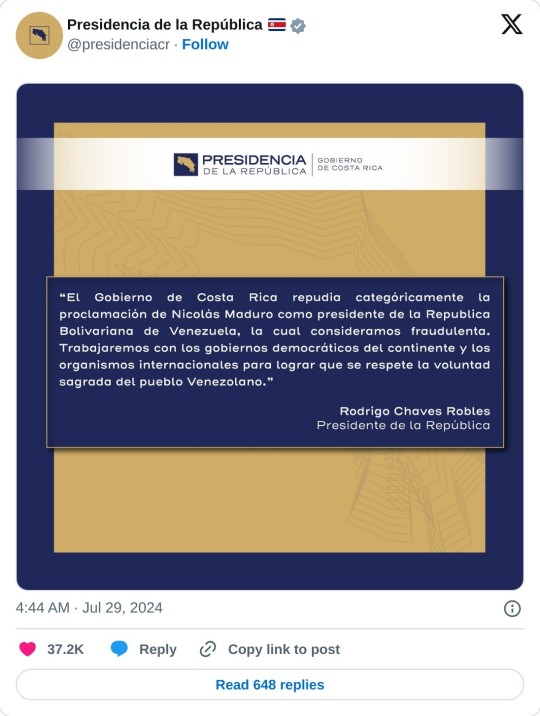
[Logo] Presidency of the Republic, Costa Rica Government.
The Government of Costa Rica categorically repudiates the proclamation of Nicolás Maduro as president of the Bolivarian Republic of Venezuela, which we consider fraudulent. We will work with the democratic governments of the continent and international organizations to ensure that the sacred will of the Venezuelan people is respected.
— Rodrigo Chaves Robles, President of the Republic of Costa Rica
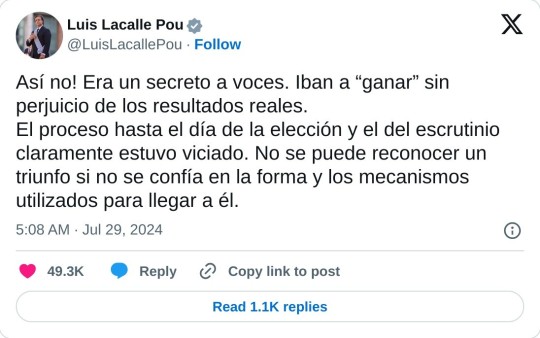
Not this way! It was an open secret. They were going to “win” regardless of the actual results. The process up to election day and counting was clearly flawed. You cannot recognize a triumph if you do not trust the form and mechanisms used to achieve it.
— Luis Lacalle Pou, President of the Oriental Republic of Uruguay
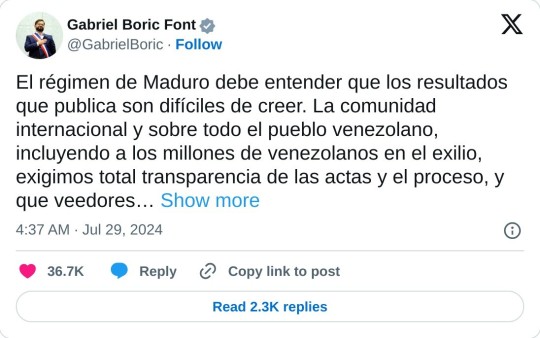
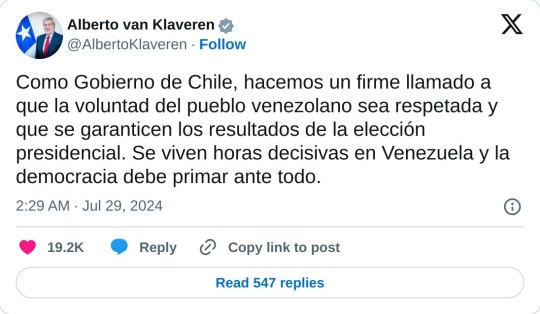
The Maduro regime must understand that the results it publishes are difficult to believe. The international community, and especially the Venezuelan people, including the millions of Venezuelans in exile, demand total transparency of the records and the process, and for international observers not committed to the government to attest to the veracity of the results.
From Chile we will not recognize any result that is not verifiable.
— Gabriel Boric Font, President of the Republic of Chile
As the Government of Chile, we make a firm call for the will of the Venezuelan people to be respected and for the results of the presidential election to be guaranteed. These are decisive hours in Venezuela and democracy must prevail above all.
— Alberto van Klaveren, Minister of Foreign Affairs of Chile
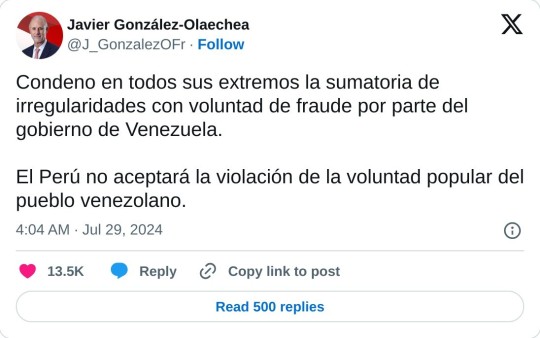
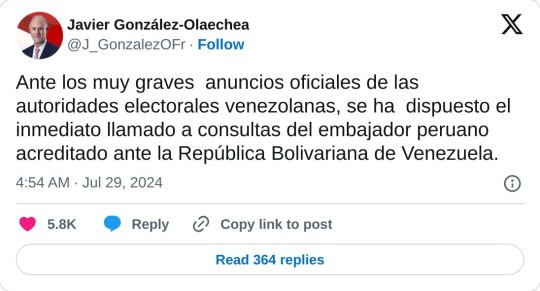

I condemn in all its extremes the sum of irregularities with the intention of fraud on the part of the government of Venezuela.
Peru will not accept the violation of the popular will of the Venezuelan people.
Given the very serious official announcements of the Venezuelan electoral authorities, the immediate call for consultations of the Peruvian ambassador accredited to the Bolivarian Republic of Venezuela has been arranged.
Several countries in the region are coordinating joint actions so that the will of the Venezuelan people expressed yesterday is undoubtedly respected. There is no going back, take as long as it takes. Our ambassador in Venezuela, called in for consultations, leaves Caracas today.
— Javier González-Olaechea, Chancellor of Peru
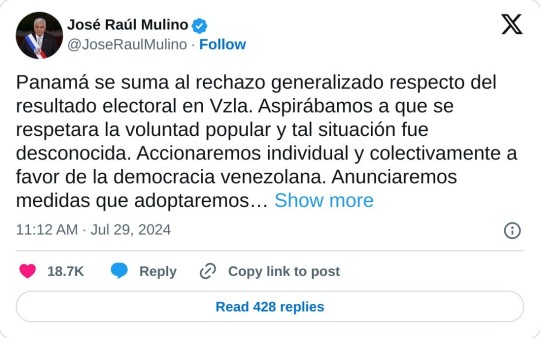
Panama joins to the generalized rejection regarding the electoral result in Vzla. We aspired for the popular will to be respected and such a situation was not expected. We will act individually and collectively in favor of Venezuelan democracy. We will announce measures that we will adopt in accordance with inter-American rules in the coming hours.
— José Raúl Mulino, President of the Republic of Panama

DICTATOR MADURO, OUT!!!
Venezuelans chose to end the communist dictatorship of Nicolás Maduro. The data announce a crushing victory for the opposition and the world is waiting for him to recognize defeat after years of socialism, misery, decadence and death.
Argentina is not going to recognize another fraud, and hopes that the Armed Forces this time will defend democracy and the popular will.
Freedom Advances in Latin America.
— Javier Milei, President of the Argentine Republic
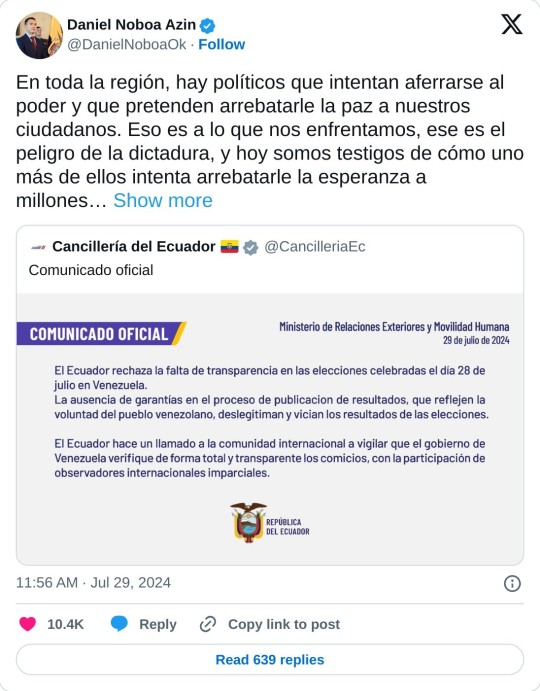
Throughout the region, there are politicians who try to cling to power and seek to rob our citizens of peace. That is what we are facing; that is the danger of dictatorship, and today we are witnessing how one more of them tries to take hope away from millions of Venezuelans.
Ecuador had the opportunity to prevent the interests of a few from prevailing over the will of millions. Venezuela deserves that opportunity; therefore, I have requested our foreign minister to take the necessary steps to convene the Permanent Council of the OAS to address the delicate situation in Venezuela.
— Daniel Noboa Azin, President of the Republic of Ecuador
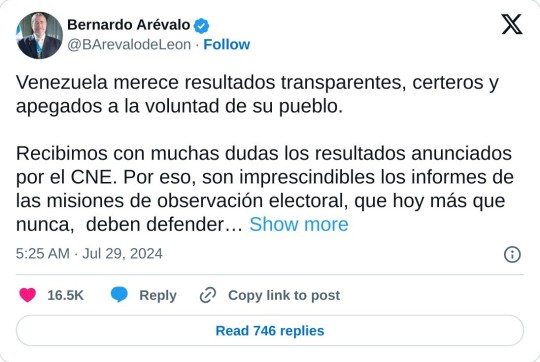
Venezuela deserves transparent, accurate results that adhere to the will of its people.
We receive the results announced by the CNE with many doubts. For this reason, the reports of the electoral observation missions are essential, which today, more than ever, must defend the vote of Venezuelans.
— Bernardo Arévalo, President of the Republic of Guatemala
29 notes
·
View notes
Text
So I watched this Legal Eagle video. So Trump without a concrete reason took a group of venezuelan asylum seekers.
Let's get some context
Bukele is the king of just throwing people in jail for years without due process. Basically he jailed everybody with a tattoo for years and years. And People LOVE him for it. They think it's awesome. Maybe they acknowledge that people get caught in the crossfire but they think it's worth it if it means "cleaning up the streets". The fact that Trump is teaming up with that guy and using him to do his dirty work should scare you.
Putin has been fairly undisputed dictator for a while. Nobody really comes close to challenging him. The democratic infrastructure in his country has been hollowed out, barely anybody dares to run against him and even if they do they don't really have a chance. One who publicly opposed him was Alexei Nawalny. He has his issue and it's generally thought he didn't have a chance in pure numbers, but he was popular enough to annoy Putin, so he was thrown in jail and after a while murdered in prison.
There's a guy in Turkey. His name is Erdogan. He has a bit of a sketchy track record. He's also pretty popular. He has been extending and extending and extending his term. There's one sort of old fashioned party entrenched in the country. They have their own issues of getting their shit together and Picking the right person to oppose him. Think of them, structurally as the democrats. When they tried to field a sort of not charismatic enough old guy against Erdogan in the last presidental elections, they got beat. Now there's a guy who people say is an up and comer, younger, popular, Major of Istanbul. Maybe somebody who could finally challenge Erdogan's popularity. Well, Erdogan just had him arrested. Him and 100 People who work for him.
There's a guy in Hungary. His name is Orban. He has a bit of a sketchy track record. He just made it illegal to hold a pride parade and announced that they would use facial recognition to spot and try anybody who attends, just to give you an impression. The local opposition has since years tried to get their shit together against him and Orban has just been wiping the floor with them. Except recently, there's a new guy there, kind of Nawalny figure, named Peter Magyar who has been making a bit of an appearance in the polls. If I were him, I would be looking around and getting scared.
Putin was considered the odd one out, the one in his weird far away cold country where you sort of expect the political habits to be more rough.
Bukele, well, it's just an oddball small country in South America, they always do crazy chaotic shit, ya know.
Putin has killed his political rivals. Erdogan has just jailed his. Trump has just shown that he will team up with a dictatorial henchman who is willing to just enjail anybody including non citizens at Trumps order.
If I were a Hillary Clinton or Joe Biden, this is the point where I would start looking into getting private protection.
Trump is testing out his boundaries. He hasn't met a violent dictator from Putin to Bukele he didn't like.
The US is the most powerful country in the whole world. If Trump decides to go the same path, it will signal to every just skating buy dictator from Orban to Serbia's Vucik… why not just throw anybody in jail who you don't like and who could be your competition? Why not undermine the competition so nobody can ever get rid of you again?
You don't want dictatorship
Yes, if you are left wing, you probably know you don't want dictatorship. Because you know it will be shit, for women, for LGBT folk, for working People. Or just because you have ideals like freedom or rule of law.
But even if you think you are right wing, you don't want dictatorship. Because dictators start stupid conflicts that get your children killed, because dictators once they feel they are untouchable and don't have to prove anything anymore always go corrupt. Just ask the 15 People who got crushed by debris due to government corruption Serbia.
Because dictators once they get into a habit of jailing and murdering their opposition usually get paranoid and can't stop and turn onto their former allies pulling the countries into devastating inner turmoil. Because at some point they end up going after somebody who actually does bite back or they end up killing somebody who is actually responsible for making the trains run on time.
Because they are like big corporations. They fuck with competition, they want monopoly of powers that make the world worse for everyone. And they'll do poisonous thing just to preserve it.
6 notes
·
View notes
Text
In the final weeks of 2024, Taiwan’s parliament once again turned into a pugilistic arena, as ruling-party lawmakers brawled with their opposition counterparts over barricades of furniture at the chamber entrances. It was at least the fourth such bust-up in 2024. Legislative brawls have a long tradition in Taiwan, but mostly they’re performative flailing. The fighting in 2024 saw lawmakers exchange punches, wrestle, throw water bottles, and even saw a male ruling-party legislator tackle and throw a female opposition counterpart to the ground.
As appalling as it was, the clashes were almost all instigated by the ruling Democratic Progressive Party (DPP), which still holds the presidency but is the minority in the legislature, where the opposition holds 62 out of 113 seats.
The ruling party’s continuous use of violence in the legislature and rallying of the public against the opposition and the legislature is undemocratic and reminiscent of heavy-handed tactics used by regimes in partly democratic states. The DPP and its supporters have tried to justify its actions by making wild claims about how the opposition is trying to create a parliamentary coup and “parliamentary dictatorship.”
In some ways, the situation resembles South Korea, where now-impeached President Yoon Suk-yeol declared martial law on Dec. 3 due in part to his irritation at the majority-controlled legislature. Incredibly, the DPP released a post on social media soon after Yoon’s martial law announcement that night implying support. It quickly withdrew that post, but not before people took note of it, which led to Taiwanese President Lai Ching-te having to reassure the public that the DPP did not support martial law.
Taiwan’s turbulent domestic politics have gone largely unnoticed despite the island sitting on a geopolitical fault line. The legislative fight on Dec. 20 occurred because the DPP was trying to prevent a vote on the third reading of several amendments that were eventually passed.
Back in May, legislative fights broke out after the DPP desperately tried to prevent a vote on amendments that would increase the power of the legislature and require the president to address the legislature, in essence seeking to both bolster the body and hold the president more accountable. They were passed by the legislature, but instead of signing them into law, Lai sent them to the Constitutional Court, which subsequently rejected most of the their powers. There have also been “smaller” fights in the legislature in the months in between, for similar reasons.
In addition, there is a pro-DPP protest movement that started in May that on Dec. 20 even tried to break into the legislature while it was in session, encouraged by several DPP legislators.
Besides legislative brawls, the government is also taking on the Taiwan People’s Party (TPP), the smaller of Taiwan’s two main opposition parties, indicting its founder, Ko Wen-je, a popular former Taipei mayor, on corruption charges related to a construction project during his mayoral term as well as funding for his presidential campaign last year. In the final week of December, prosecutors demanded that he be sentenced to an astonishing 28.5 years, after having held him incommunicado since September.
Ko was granted bail by the Taipei District Court, which led prosecutors to appeal to the High Court, which asked Ko to return for another bail hearing. Ko was granted bail a second time by the district court, which again led to prosecutors arguing for him to be brought back for a third bail hearing within a week. This time, on Jan. 2, Ko was ordered to return to detention.
The DPP and its supporters claim aggressive legislative antics are necessary to prevent certain bills or amendments from being passed that might undermine national security, but this is suspiciously opportunistic. After all, each of these bills and amendments reduces the political power of the DPP, whether by increasing scrutiny of the president, expanding legislative powers, or raising the threshold for launching recalls of elected politicians in positions where the main opposition Kuomintang (KMT) currently holds more offices.
That the KMT and TPP usually team up in the legislature, ensuring they can pass or vote down whatever bills they want, may be infuriating to the DPP, but that is how democracy works, specifically a divided government, which the US and even Taiwan itself has had several times. The DPP has relied heavily on the anti-China card while neglecting key problems such as energy, housing prices, and traffic deaths during the past few years, which saw it losing heavily in the November 2022 local elections.
Although the DPP lost the legislative majority in the national elections last January, the DPP’s Lai won the presidency, but only with 40 percent of the vote, despite facing two opposition candidates including Ko. It’s a situation reminiscent of South Africa, where the incumbent African National Congress (ANC) party also retained its presidency in last year’s election—but with only 40 percent of the vote. This required the party to form a coalition, but more importantly, to put aside its pride and work with the Democratic Alliance, the main opposition party that has starkly different views from the ANC. Taiwan’s DPP, in contrast, has eschewed any reconciliatory or cooperative approach with the KMT and TPP.
All this bickering, whether in the political, legal, or physical arenas, is extremely worrying. It has fostered a dysfunctional political climate and escalated societal tensions, and it now threatens to undermine democracy.
For example, Taiwan’s highest court, the Constitutional Court, has had seven vacancies after seven justices finished their terms last October. However, the legislature blocked all seven of Lai’s nominees in December, so the court, which usually has 15 justices, remains only just over half full.
Meanwhile, the government insists that one of the amendments passed on Dec. 20, the proposed increase of funding for local governments at the expense of Taipei, will undermine increased defense spending that it argues is essential for preparing for a future conflict with China.
Another amendment that raises the threshold for holding recalls against elected officials has been accused by the DPP of taking away the right of the public to hold politicians to account. Yet in Taiwan, recalls have been wielded in a retaliatory and petty manner as political weapons rather than as legitimate means of kicking bad politicians out of office, and the opposition’s proposals such as requiring signatories of recall petitions to provide photocopies of their ID cards are not unreasonable.
While the latter two amendments still have to be sent to Lai to be signed, an amendment that raises the minimum quorum for Constitutional Court hearings was promulgated on Jan. 23, though not before initially being sent back to the legislature for a revote. This was rejected by the legislature, so Lai had no choice but to implement the amendment, which came into effect later that week. However, both Lai and the DPP’s legislative caucus have said they would call on the Constitutional Court to review the amendment, which means further legal wrangling.
The detention of Ko after his third bail hearing caused the TPP to hold a rally to denounce what it claims is political persecution. A massive crowd of 150,000 gathered in Taipei on a cold Saturday on Jan. 11, a resounding demonstration of mass public discontent with the DPP, especially given that the TPP is only Taiwan’s second-largest opposition party. At the rally, the TPP slammed “green authoritarianism” (green is the DPP’s color) and warned that if the DPP could use the judicial system against Ko, it could go after any other politician. KMT politicians also appeared at the rally, further solidifying the two parties’ informal alliance.
In early January, the DPP legislative caucus whip threatened that the party might seek to recall over 40 KMT and aligned independent legislators, while the KMT replied that any such attempt would be met in kind. The DPP has since initiated petitions to demand recall referendums for over 30 opposition lawmakers, with the KMT also doing the same for several DPP legislators.
Engaging in violence in the legislature to prevent bills from being passed, launching what many see as a political witch hunt against the leader of the third party, and attempting politically motivated recalls to target dozens of opposition lawmakers is a terrible look for any self-respecting democracy, much less one that is considered by some as a model in Asia. These dysfunctional domestic politics are not just embarrassing, but damaging for Taiwan’s stability.
6 notes
·
View notes
Note
Can you elaborate on the gadsden flag stuff?
Sure. I had a better response to this typed out in my head last night but. A lot of it comes from what I'd say is really frustratingly popular politics. As libertarians morphed from "I want gay couples to defend their weed with guns" into the tea party, the gadsen flag became associated with a group of people who are otherwise despicable, etc, "acceptable targets", whatever. In response to this, the type of people who desire a dictatorship of the many see it as a perfectly acceptable marker to flag someone as someone who should be abused just for the sake of it, for being of the wrong tribe. This is like, funda-fucking-mentally bad philosophy, bad optics, bad praxis. You target something that says "dont oppress me" and go out of your way to brag about how much you want to oppress them and strip them of civil rights? This isn't a "States Rights To Do What" situation, it's punching down at people who you're choosing to associate with a group of acceptable targets because you really, really like the idea of stripping your political opponents, or really, your political non-allies, of their rights due to your crusade against other ideologies. Going "Actually you should be oppressed for expressing your opposition to others getting up in your business" is a terrible paternalist response by a wide variety of groups, because, sure, it started with like, "an"coms, but is clearly a feature of what people call capital L Liberals philosophy now, the HR department of life.
#this doesnt really flow very well sorry#my cursed eye is fighting a battle in another plane right now
12 notes
·
View notes
Note
🔥 - i'd like to order an unpopular opinion on leverage, please!
Sorry for the very, very late answer, but to make up for it, have two unpopular opinions:
The first one's a bit of a cop-out. I think it's the less popular opinion, but probably because most don't care that much either way:
I head-canon that Damien Moreau is actually a banker/financier, ie, his primary source of income is actually derivatives investments and market prediction, and all the buying countries, arms deals and other such clandestine activities is just to give markets slight pushes in the direction he wants. (I've previous talked about this here (my last reblog addition))
This opinion seems "unpopular" in that the more common reading is that he's a mob boss who just calls himself a 'banker' to make himself sound cooler than he actually is. Which I think is a totally valid reading, consistent with what we are shown in canon! Like, he's all about image, and it's totally believable that the entire financier/banker persona is just that.
One reason I prefer the actually-a-banker reading is, as I described in the other post, because I like the parallel with team leverage and their "alternative revenue stream". This is also why I like to head-canon that when Eliot and Moreau were starting out (after Eliot met Toby and left the PMCs with his newfound conscience), before things got bad, they actually did good--only destabilizing horrible, abusive dictatorships, using their alternative revenue stream to help people. The parallels are just so compelling to me this way.
Another reason I prefer the actually-a-banker reading is that it's more relatable to me. I know people who work as financiers (hedge fund/high frequency trading/crypto firm founders or high-level quants etc).
None of them (that I know of) would actually do illegal things to manipulate prices, but it sometimes seems like if they were a little less risk-averse, a little less ethical, who knows? And when they tell me about the people they know, people they describe as "if you took a person's stats and dialled 'ethics' all the way down to zero"... These friends think anyone too stupid to see through a cryptocurrency white paper deserves to lose their life's savings. So when they say someone has ethics dialled to zero, well. You don't wanna know.
On the other hand, I don't know anyone who's anywhere close to being a mob boss.
-
Here's a more genuinely unpopular opinion, in that I think most people believe the opposite, and actually do care:
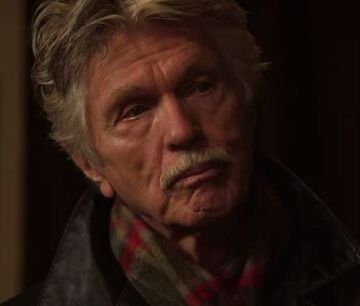
I really like Jimmy Ford. I find the character very relatable and very compelling. I feel like a lot of people in the fandom just write him off as a bad father, but I don't think that's fair.
I talked a lot about this here (skip past the "..." paragraph; above that were my old early thoughts about Moreau, before I reformulated them to be my current thoughts)
As I mentioned there, I see in Jimmy Ford every parent who didn't understand their kid, but loved them, and as Jimmy said to Nate, that's more important.
Every parent who grew up at a different time, in another country, in a harder, less forgiving world, who wants to ensure their kid can survive that old environment, without realizing that that isn't the kid's world anymore, that their kid is actually thriving in this new world, the one their parents sacrificed to raise them in
Every parent who flipped out when their son decided to major in sociology instead of computer engineering, because they could never have made a living with a degree like that
(but he's going to do more than make a living with that degree; he's going to make a difference)
Every parent who constantly monitors their daughter to ensure she waits for marriage, because in the old country she would have been shunned or worse if she didn't
(but she's not there right? her parents worked and sacrificed and bled to bring her up in this more forgiving world)
Every parent who sits next to their kid for hours a day until they get their daily hour of piano practice done (and yells at them until they do every day, disturbing their neighbour, who's just trying to focus on doing her research and grading her students' papers, not that this is personal or anything), because the parent managed to survive and to move to this country by working relentlessly at everything they did and can't imagine a world where a 7-year-old is allowed to play and to find their own interests
(but they will, maybe not then, but one day, years down the line, they may even end up liking music)
Maybe it's that I'm a kid of immigrants who knows a lot of kids of immigrants, but I think I'm more forgiving of people who raised their children in a culture different from their own and struggled to adjust to that.
71 notes
·
View notes